PR
X
Keyword Search
▼キーワード検索
Comments
私はイスラム教徒です@ Re:アイルランド・ロンドンへの旅(その131): ロンドン散策記・アルバート記念碑(Albert Memorial)-2(11/06)
神神は言った: コーランで 『 (21) 人々…
私はイスラム教徒です@ Re:アイルランド・ロンドンへの旅(その122): ロンドン散策記・Victoria and Albert Museum・ヴィクトリア&アルバート博物館-5(10/28)
神神は言った: コーランで 『 (21) 人…
続日本100名城東北の…
New!
オジン0523さん
【甥のステント挿入… New!
Gママさん
New!
Gママさん
2025年版・岡山大学… New!
隠居人はせじぃさん
New!
隠居人はせじぃさん
ムベの実を開くコツ… noahnoahnoahさん
noahnoahnoahさん
エコハウスにようこそ ecologicianさん
【甥のステント挿入…
 New!
Gママさん
New!
Gママさん2025年版・岡山大学…
 New!
隠居人はせじぃさん
New!
隠居人はせじぃさんムベの実を開くコツ…
 noahnoahnoahさん
noahnoahnoahさんエコハウスにようこそ ecologicianさん
Calendar
カテゴリ: 海外旅行
ATHLONE BESIEGED
1 6 9 0ー1
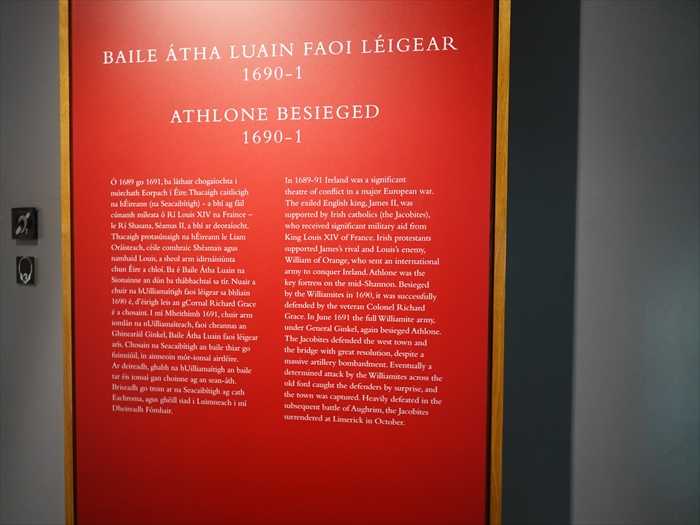
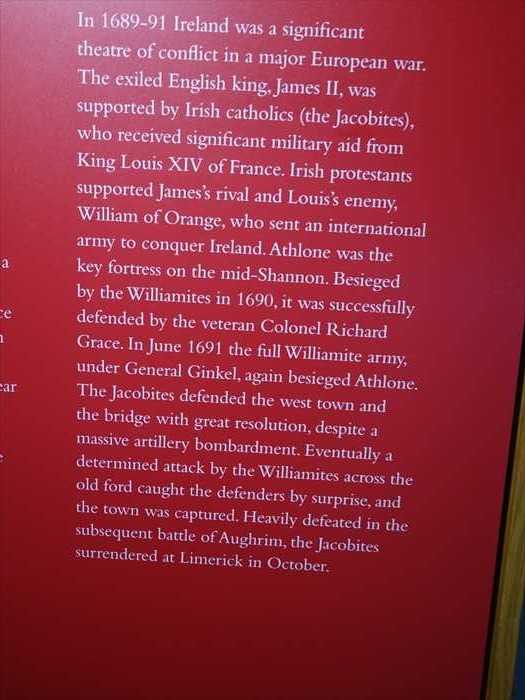
至るまでの出来事を紹介している。ギャラリーは、戦闘中の軍隊を360度の
ビクターアンブラスのスケッチが描かれている。3人の登場人物の音声によって当時の
アスローンでの生活を紹介しているのであった。
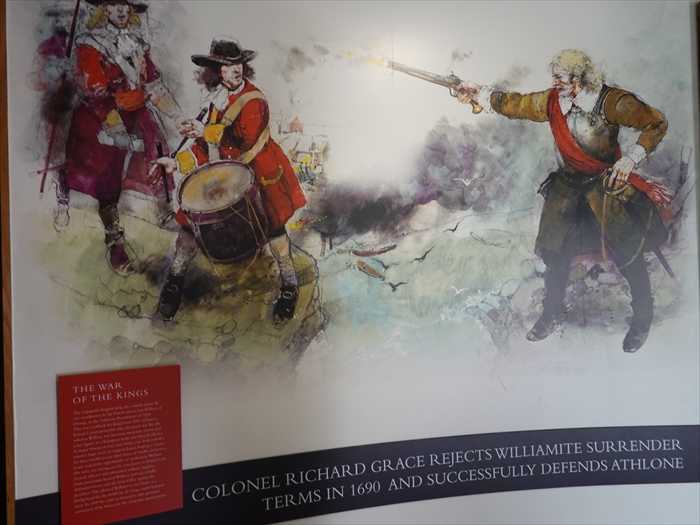
THE WAR OF THE KINGS
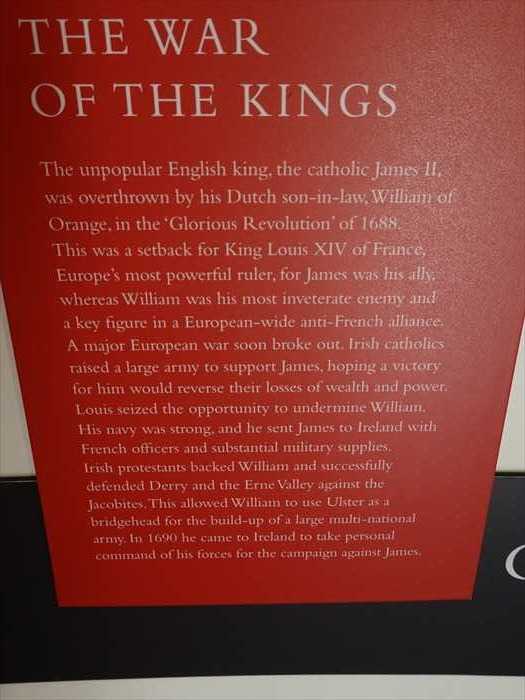
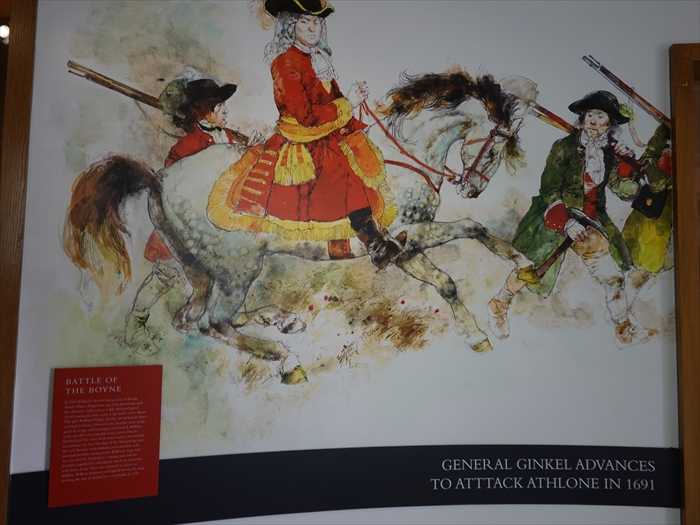
BATTLE OF THE BOYNE
In 1690 William's 35,000-strong army of British,Dutch,Danes,Huguenots and Irish
protestants took the offensive south and on 1 Jury defeated James's 24,000-
strong Jacobite army at the battle of the Boyne.
This gave William Dublin and the east of Ireland.James returned to Flance.However,the
Jacobite army made good its escape and regrouped at Limerick.William made no offer
of reasonable peace terms.Patrick Sarsfield and the other Irish army leaders determined
to continue the war.The line of the Shannon became the new frontier,with Athlone and
Limerick as the princepal Jacobite strong points.Willam's siege train was wrecked by
Sarsfield in a daring raid.and the Jacobites repulsed his subsequent attack on Limerick
with heavy losses.They also defeated an attack on Athrone.William returned to England
leaving his army to bring the war in Ireland to a conclusion in 1691.
【 ボイン川の戦い(1690年)
1690年7月1日、ウィリアム王(ウィリアム3世)は、イギリス人、オランダ人、デンマーク人、
ユグノー(フランス新教徒)、アイルランドのプロテスタント兵を含む3万5千人規模の連合軍を
率いて南進し、ジェームズ2世率いる2万4千人のジャコバイト軍と対峙しました。
その結果、ボイン川の戦いでウィリアム軍が勝利し、ダブリンとアイルランド東部を掌握しました。
ジェームズ2世はフランスへ逃れます。
しかし、ジャコバイト軍は巧みに退却し、リムリックで再編成に成功します。ウィリアムは和解の
ための妥当な条件を提示せず、パトリック・サーズフィールドをはじめとするアイルランド軍の
指導者たちは、戦争の継続を決意しました。
シャノン川が新たな戦線の境界となり、アスローンとリムリックがジャコバイト側の主要な
防衛拠点となりました。
ウィリアム軍の重砲部隊(包囲用の兵器)は、サーズフィールドの大胆な奇襲によって壊滅し、
その後のリムリックへの攻撃もジャコバイト側が撃退し、ウィリアム軍に大きな損害を与えました。
さらに、アスローンへの攻撃も失敗に終わりました。
その後、ウィリアムはアイルランドを離れ、残された軍隊に対し、戦争の終結を目指すよう命じて
1691年を迎えます。】
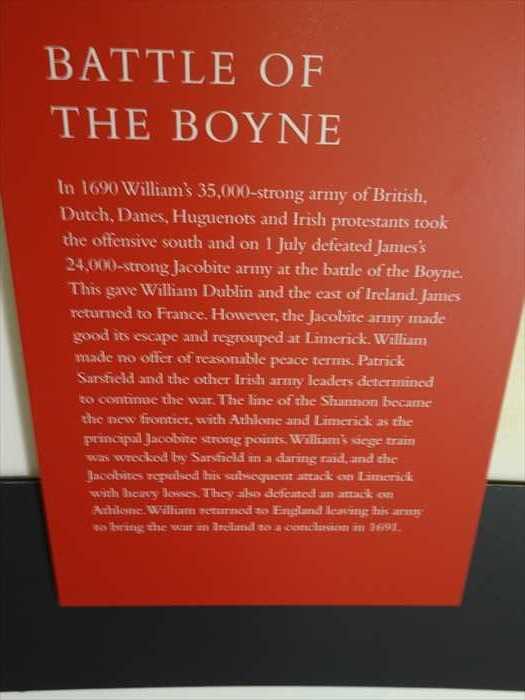
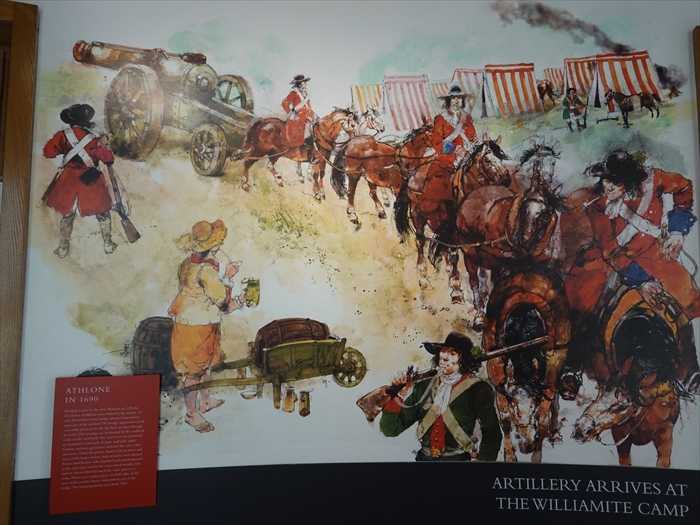
ATHLONE IN 1690
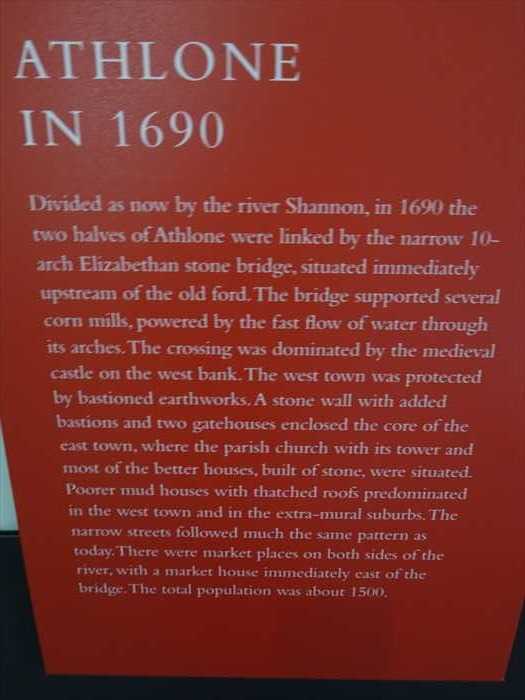
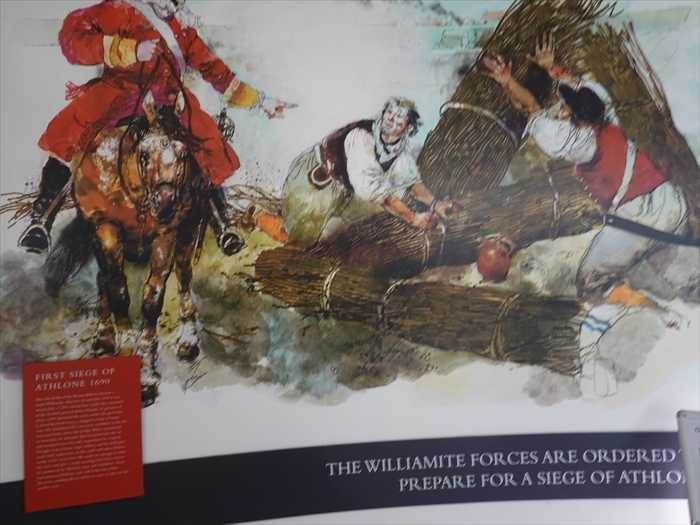
FIRST SIEGE OF ATHLONE 1690
【 1690年 アスローン第一次包囲戦
ボイン川の戦いの後、アスローンはウィリアマイト軍(ウィリアム王側)の主要な攻略目標と
なりました。1690年7月中旬、スコットランド人のジェームズ・ダグラス将軍が指揮する
7,500人規模の軍がアスローンを攻撃しました。
町を守っていたのは、2,000人ほどの守備隊で、指揮官は多くの戦争を経験した頑固な老将、
リチャード・グレース大佐でした。
グレースはまず東側の町を放棄し、川を渡って西側へ撤退すると、橋を破壊しました。
降伏を勧告された際には、空に向けてピストルを撃ち、これが自分の望む唯一の“交渉”だと叫んで
拒否したと伝えられています。
ダグラス軍は重砲(攻城砲)を持っておらず、持参していた野戦砲ではアスローン城や西側防御
陣地にほとんど効果を与えることができませんでした。
また、川を渡って攻め込む試みも一切行われませんでした。
やがて、グレースに援軍が送られるという情報を得たダグラス将軍は、包囲を解いて撤退します。
このようにして、グレース大佐はアスローンとシャノン川の防衛線を守り抜き、ジャコバイト軍が
さらに1年間戦争を継続する道を切り開いたのです。】
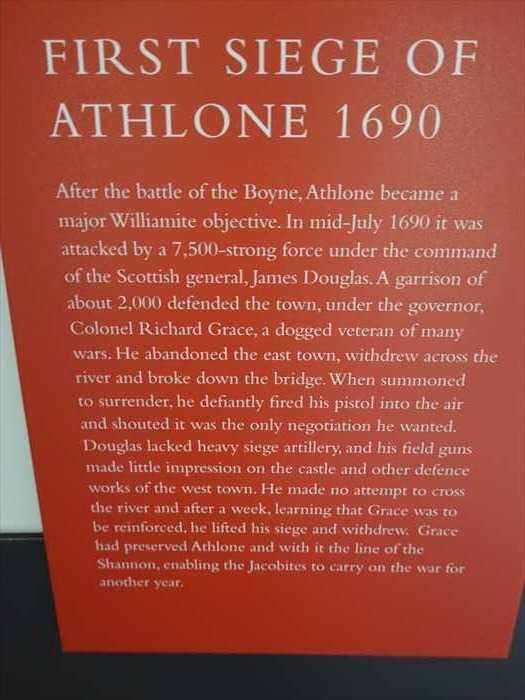
連絡通路 。

北側の石壁越しに「 Church of Saints Peter & Paul 」を見る。
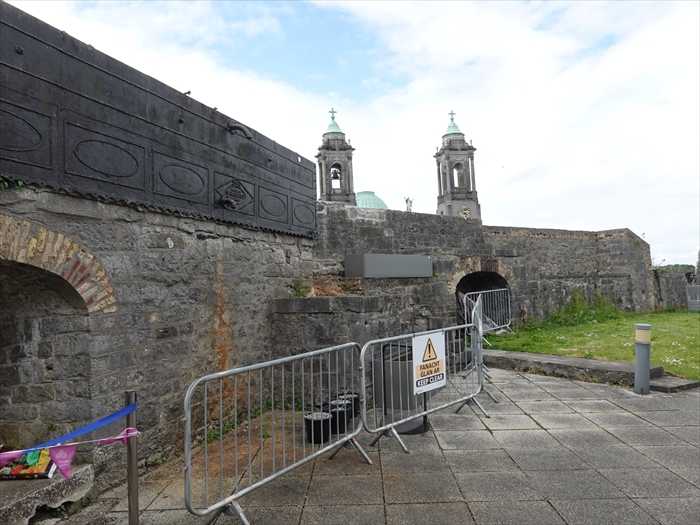
シャノン川沿いには大砲が並んでいた。
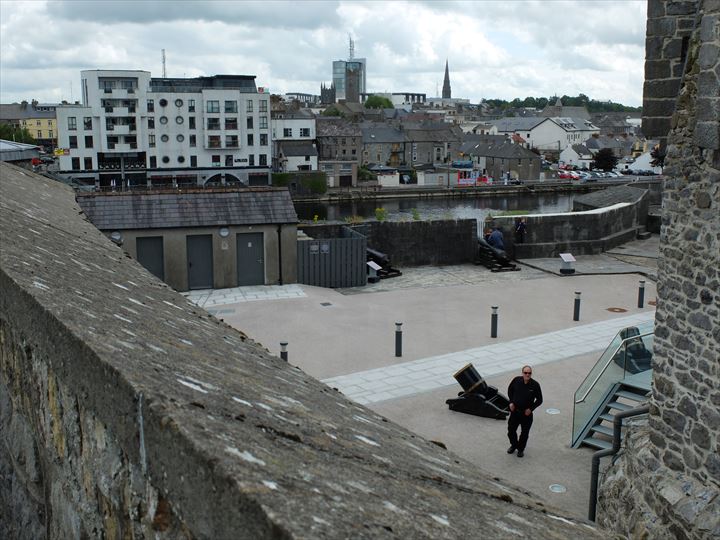
「 MARGARET DALY IRISH REFUGEE 」
【(マーガレット・デイリー ― アイルランドの難民)】。
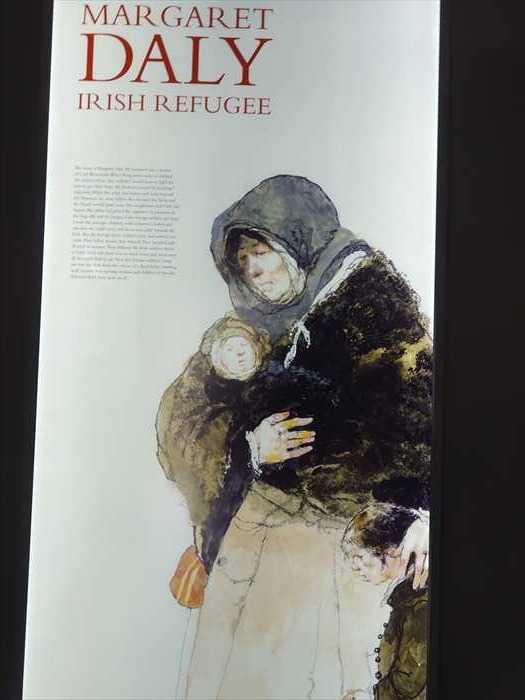
My name is Margaret Daly.My husband was a tenant of Lord Westmeath.When King James
came to Ireland the priests told us that catholics would have to fight for him to get their
share.My husband joined his lordship's regiment.When the army was beaten and went
beyond the Shannon,we were told to flee,because the Scots and the Danes would spare
none. MY neighbours and I left our homes.My eldest lad joined the rapparees or
partisans in the bogs. He will be hanged if the foreign soldiers get him.I took the younger children, with whatever clothes and oatcakes we could carry,and drove our cattle towards
Irish.But the foreign horse soldiers came and robbed our cattle.They killed anyone that
resisted. They insulted and ill-used us women. Near Athlone the lrish soldiers drove
us back. They said there was no food. Grass and roots were all we could find to eat.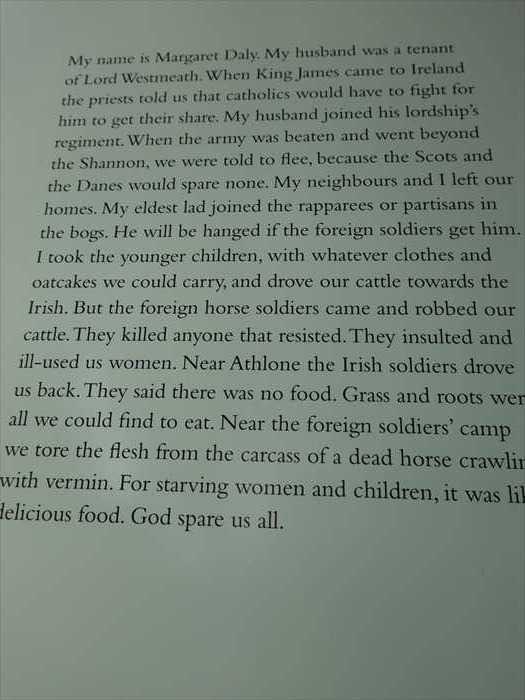
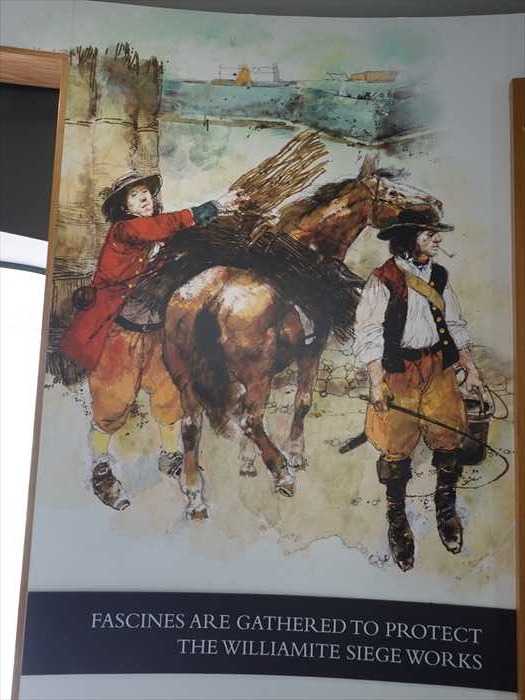
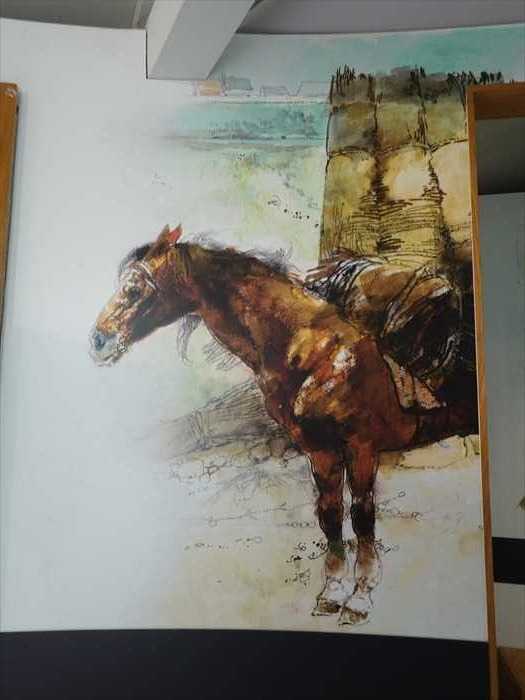
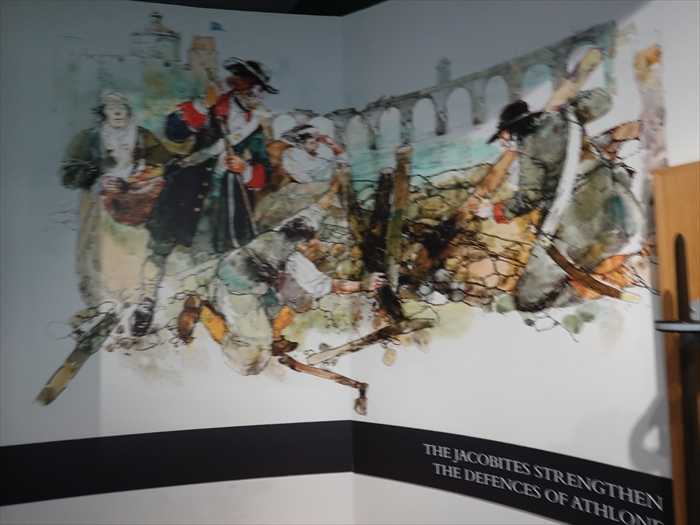
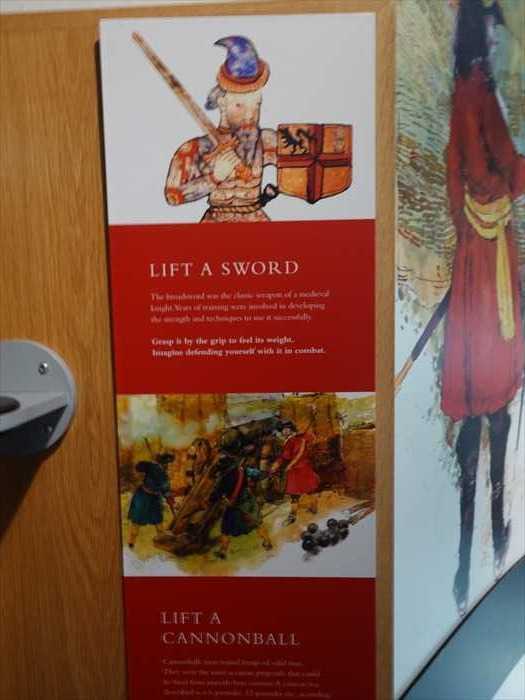
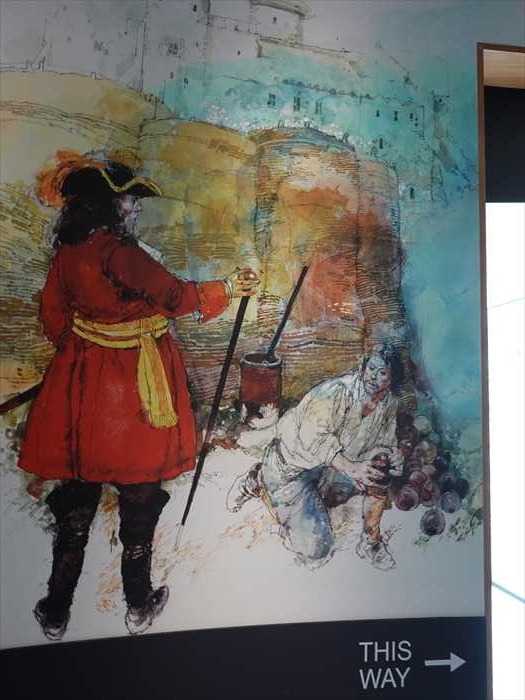
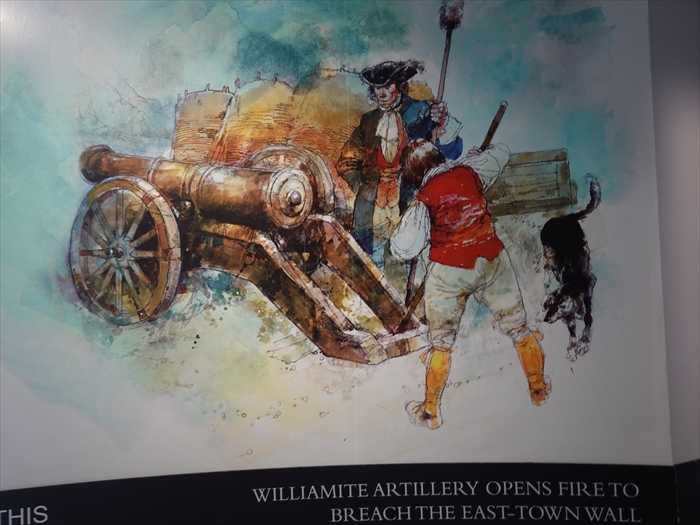
A depiction of Sergeant Custume • Athlone Castle.
【アスローン城におけるカスチューム軍曹の像】
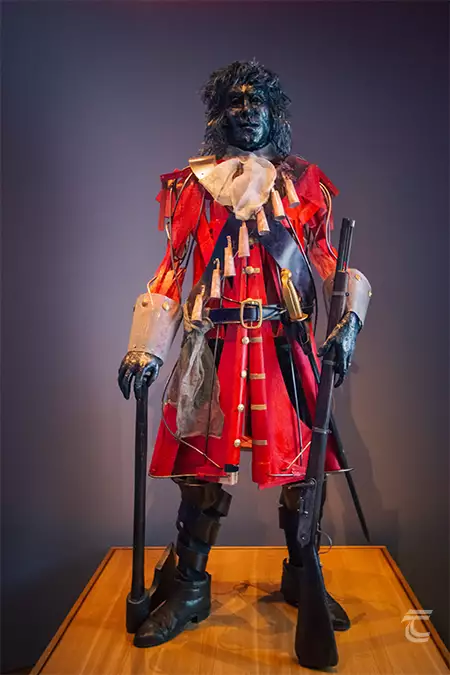
アイルランドの英雄的人物である カスチューム軍曹(Sergeant Custume)像 。
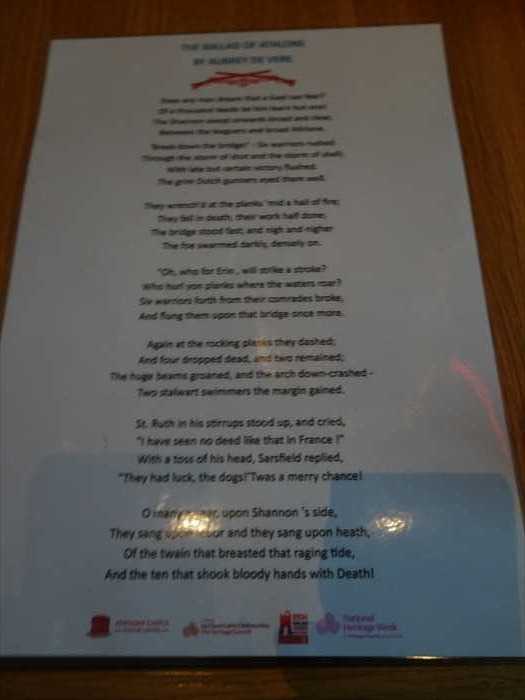
「 THA GREATE SIEGE OF ATHLONE 1691 」
【アスローン大包囲戦 1691年】
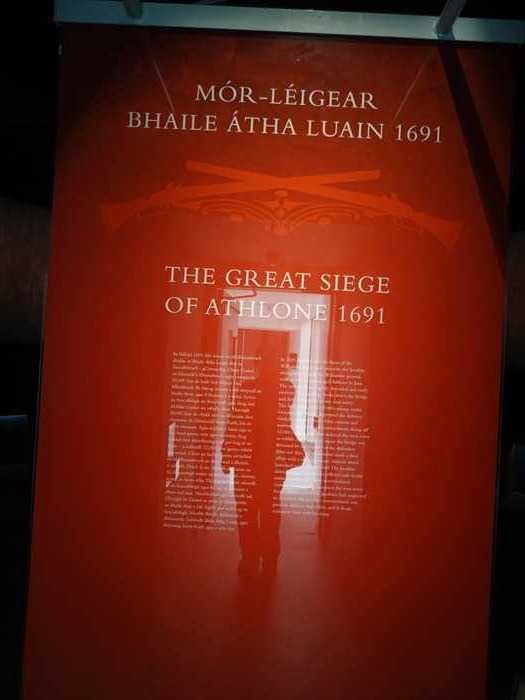
映像コーナー。
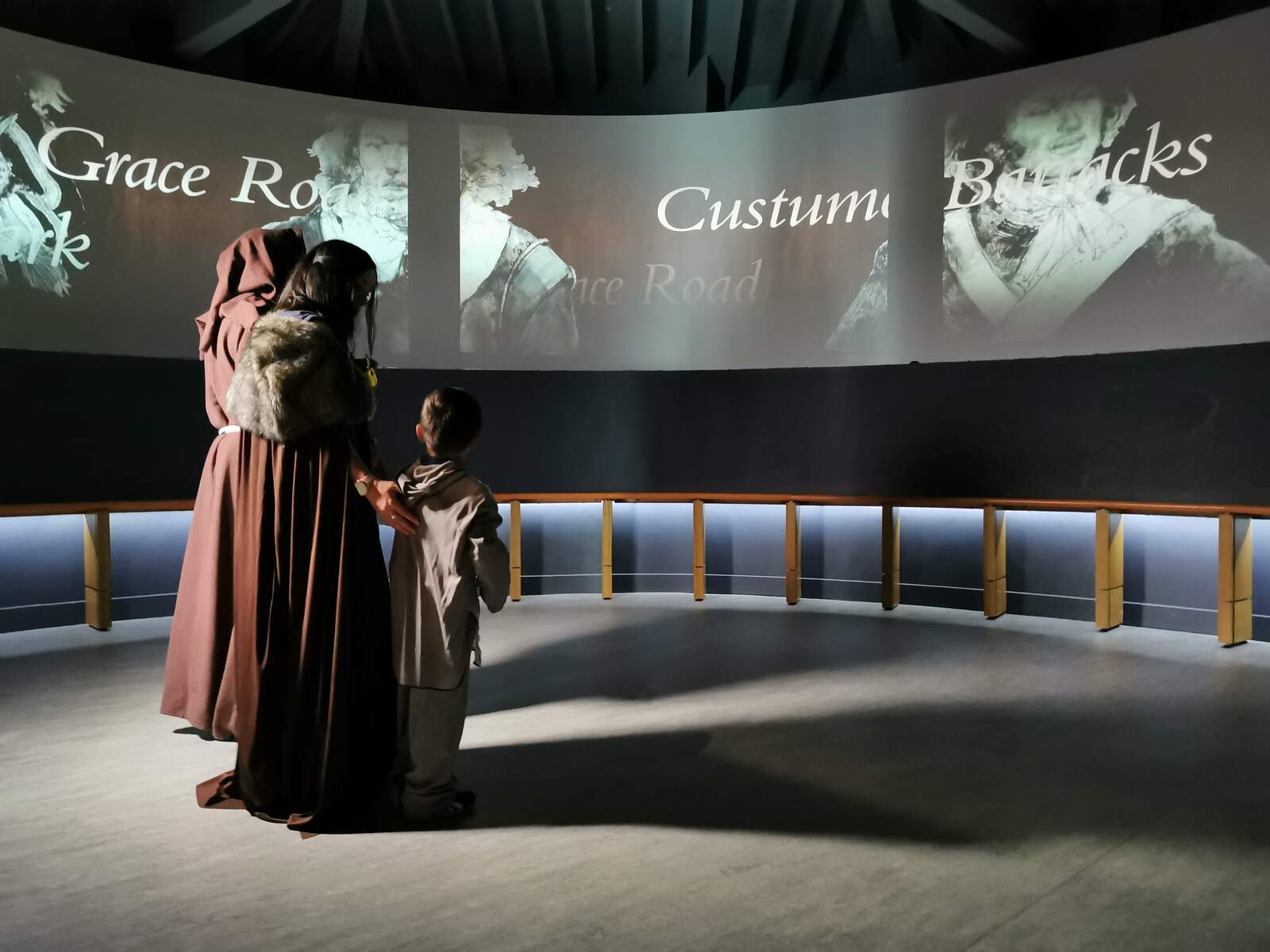
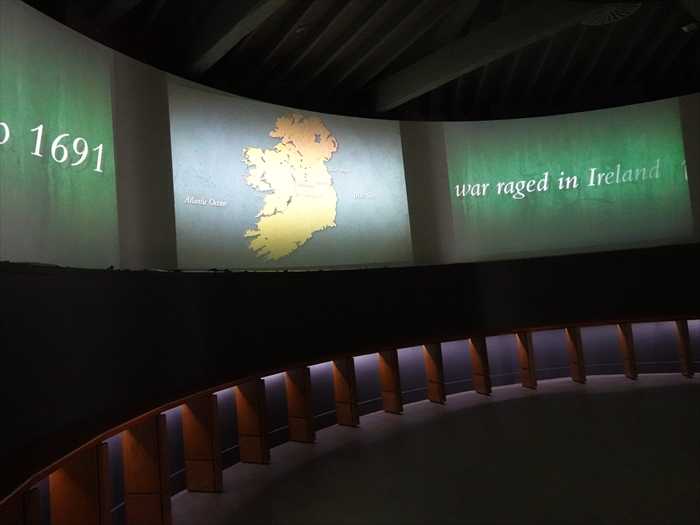
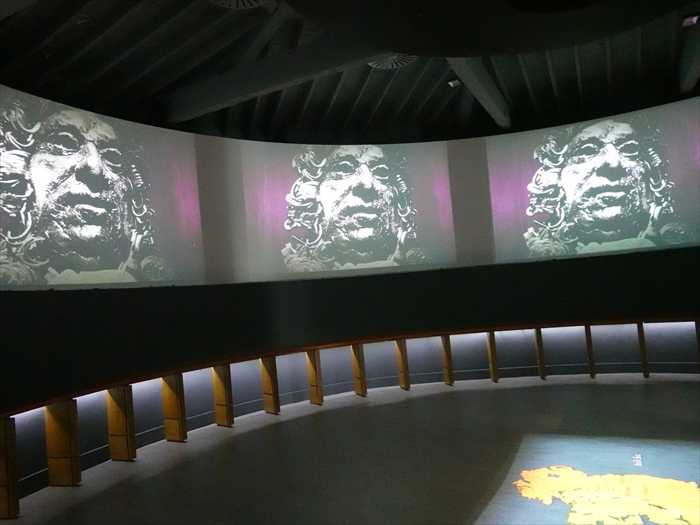
床にも映像が映されて。
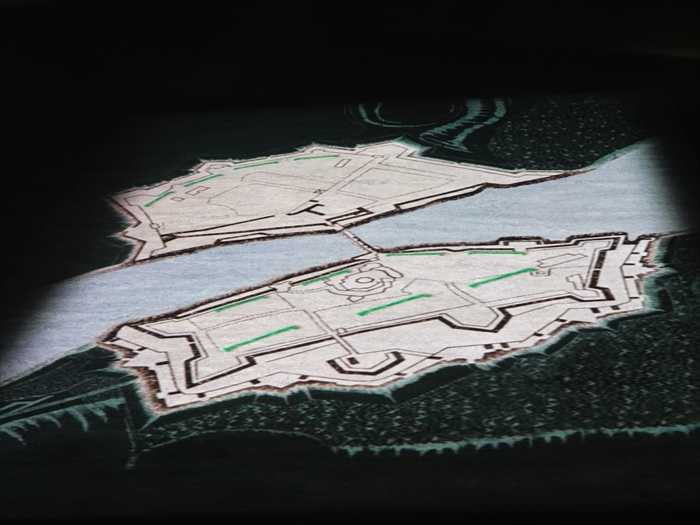
Athron Castle・アスローン城の地図。
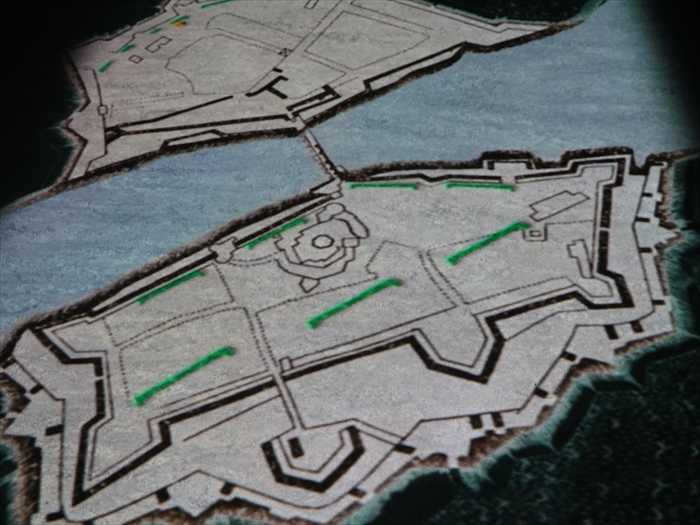
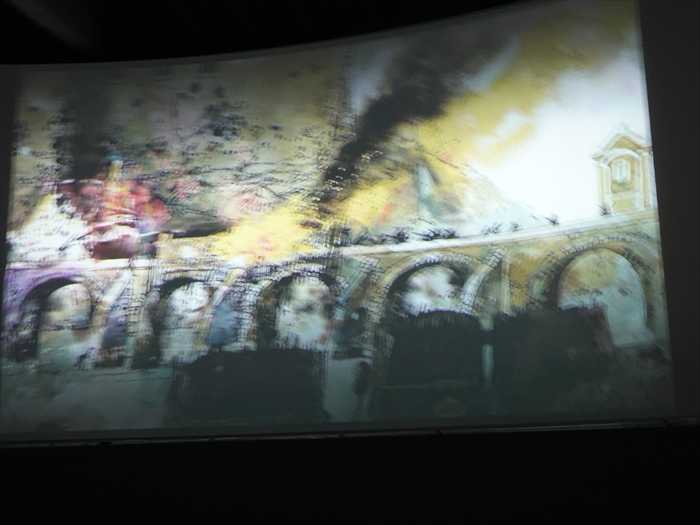
アイルランド島のほぼ中央に位置するAthron Castle・アスローン城 。
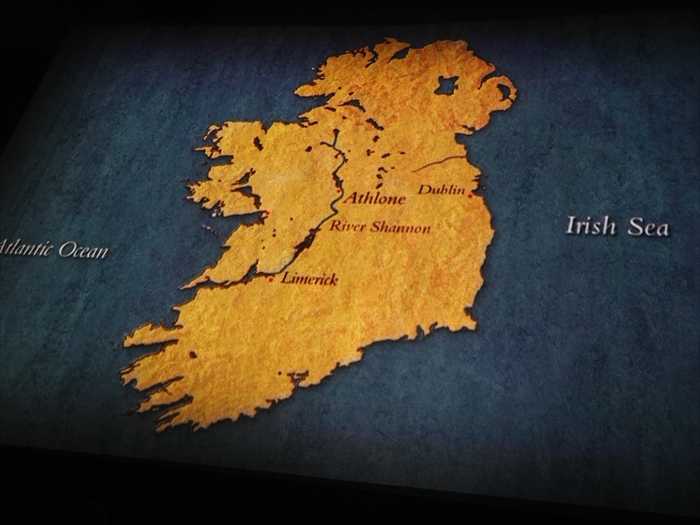
「 PEAPLE OF THE SIEGE 」
「 PEOPLE OF THE SIEGE(包囲戦の人々) 」は、アスローン城の展示などで使われる表現で、
1690年・1691年のアスローン包囲戦に関わった様々な人々を指す 。
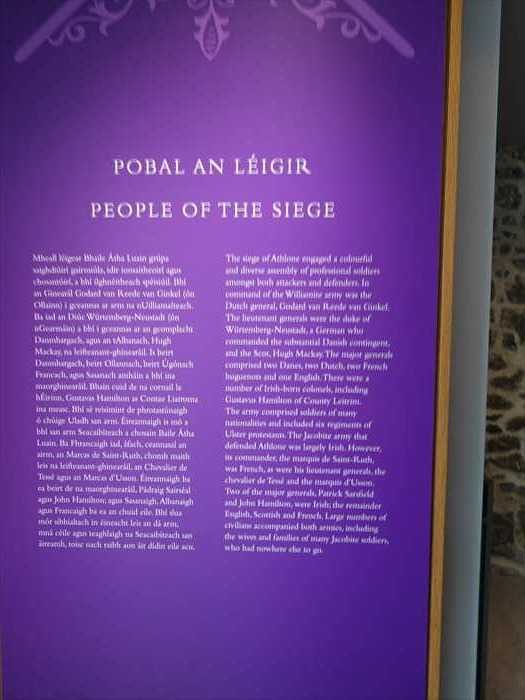
・・・ もどる ・・・
・・・ つづく ・・・
1 6 9 0ー1

ATHLONE BESIEGED
1 6 9 0ー1
ln 1689ー91 lreland was a sigmficant theatre of conflict in a major European war.
The exiled English king,JamesⅡ, wassupported by lrish catholics (the Jacobites),
who received significant military aid from King Louis XIV of France. lrish protestants
supported James's rival and Louis's enemy,William of Orange, who sent an international
army to conquer lreland. Athlone was the key fortress on the mid-Shannon. Besieged
by the Williamites in 1690 , it was successfully defended by the veteran Colonel Richard
Grace.In June 1691 the full Williamites army,under GeneraI Ginkel, again besieged AthIone.
The Jacobites defended the west town and the bridge with great resolution, despite a
massive artillery bombardment. Eventually a determined attack by the Williamites across
the old ford caught the defenders by suprise,and the town was captured.Heavily defeated
in the subsewuent battle of Aughrim,the Jacobites surrendered at Limerick in October.
【 包囲されたアスローン(1690~1691年)
1689年から1691年にかけて、アイルランドはヨーロッパ全体を巻き込んだ大規模な戦争の中で、
重要な戦場となっていました。
イングランドから追放された王、ジェームズ2世は、アイルランドのカトリック教徒
(ジャコバイト派)の支持を受け、さらにフランス王ルイ14世から大きな軍事支援を受けて
いました。一方、アイルランドのプロテスタントたちは、ジェームズの対抗者であり、ルイ14世の
敵でもあった**オレンジ公ウィリアム(ウィリアム3世)**を支持しており、彼はアイルランドを
征服するために多国籍軍を派遣しました。
アスローンは、シャノン川中流に位置する戦略上の要塞都市として、極めて重要な地点でした。
1690年、アスローンはウィリアム派(ウィリアマイト軍)に包囲されましたが、老練な指揮官
リチャード・グレース大佐のもとで防衛に成功しました。
翌年の1691年6月、ウィリアマイト軍はギンケル将軍の指揮のもと、再びアスローンを本格的に
包囲しました。
ジャコバイト側は町の西地区と橋を砲撃の嵐の中で懸命に守りましたが、最終的に
ウィリアマイト軍が古い浅瀬を通って奇襲攻撃を行い、防衛軍を不意を突いて町を攻略しました。
その後のアウクリムの戦いでジャコバイト軍は大敗を喫し、10月にリムリックで降伏しました。】
the old ford caught the defenders by suprise,and the town was captured.Heavily defeated
in the subsewuent battle of Aughrim,the Jacobites surrendered at Limerick in October.
【 包囲されたアスローン(1690~1691年)
1689年から1691年にかけて、アイルランドはヨーロッパ全体を巻き込んだ大規模な戦争の中で、
重要な戦場となっていました。
イングランドから追放された王、ジェームズ2世は、アイルランドのカトリック教徒
(ジャコバイト派)の支持を受け、さらにフランス王ルイ14世から大きな軍事支援を受けて
いました。一方、アイルランドのプロテスタントたちは、ジェームズの対抗者であり、ルイ14世の
敵でもあった**オレンジ公ウィリアム(ウィリアム3世)**を支持しており、彼はアイルランドを
征服するために多国籍軍を派遣しました。
アスローンは、シャノン川中流に位置する戦略上の要塞都市として、極めて重要な地点でした。
1690年、アスローンはウィリアム派(ウィリアマイト軍)に包囲されましたが、老練な指揮官
リチャード・グレース大佐のもとで防衛に成功しました。
翌年の1691年6月、ウィリアマイト軍はギンケル将軍の指揮のもと、再びアスローンを本格的に
包囲しました。
ジャコバイト側は町の西地区と橋を砲撃の嵐の中で懸命に守りましたが、最終的に
ウィリアマイト軍が古い浅瀬を通って奇襲攻撃を行い、防衛軍を不意を突いて町を攻略しました。
その後のアウクリムの戦いでジャコバイト軍は大敗を喫し、10月にリムリックで降伏しました。】

至るまでの出来事を紹介している。ギャラリーは、戦闘中の軍隊を360度の
ビクターアンブラスのスケッチが描かれている。3人の登場人物の音声によって当時の
アスローンでの生活を紹介しているのであった。

THE WAR OF THE KINGS
The unpopular English king, the catholic JamesⅡ,was overthrown by his DutCh son-in-law,
William of Orange,in the 'Glorious Revolution' of 1668.
William of Orange,in the 'Glorious Revolution' of 1668.
This was a setback for King Louis XIV of France,Europe's most powerful ruler, for Jarnes
was his ally,whereas、William was his most inveterate enemy and a key figure ln European—
wide anti—French alliance.
was his ally,whereas、William was his most inveterate enemy and a key figure ln European—
wide anti—French alliance.
A major European war soon broke out. lrish catholics laised a large army no support James,
hoping a victory for him would reverse their losses of wealth and power.
hoping a victory for him would reverse their losses of wealth and power.
Louis seized the opportunity to undermine William.His navy was strong,and sent James to
Ireland with French officers and substantial military supplies.
Ireland with French officers and substantial military supplies.
Irish protestants backed William to use Ulster as a bridgehead for the build-up of a large
multi-national army.In 1690 he came to Ireland to take personal command of his forces
for the campaign against James.
【 王たちの戦争
不人気だったイングランド王、カトリックのジェームズ2世は、**オランダ人の娘婿ウィリアム・
オブ・オレンジ(ウィリアム3世)**によって、**1688年の「名誉革命(Glorious Revolution)」
**で王位を追われました。
この出来事は、ヨーロッパで最も強大な君主であったフランス王ルイ14世にとって痛手でした。
なぜなら、ジェームズは彼の同盟者であり、ウィリアムは彼の宿敵であり、ヨーロッパ規模での
反フランス同盟の中心的人物だったからです。
その後まもなくして、ヨーロッパ全土を巻き込む大戦争が勃発しました。アイルランドのカトリック
教徒たちは、ジェームズを支援するために大規模な軍隊を結成しました。彼らは、ジェームズの
勝利によって、自らが失った財産や権力を取り戻せることを望んでいたのです。
ルイ14世はこの機会を利用して、ウィリアムを弱体化させようとしました。強力なフランス海軍の
支援のもと、彼はジェームズをアイルランドへ送り込み、フランス人将校や大量の軍事物資を
提供しました。
一方、アイルランドのプロテスタントたちはウィリアムを支持し、アルスター地方を橋頭堡として、
多国籍軍の集結を進めました。
multi-national army.In 1690 he came to Ireland to take personal command of his forces
for the campaign against James.
【 王たちの戦争
不人気だったイングランド王、カトリックのジェームズ2世は、**オランダ人の娘婿ウィリアム・
オブ・オレンジ(ウィリアム3世)**によって、**1688年の「名誉革命(Glorious Revolution)」
**で王位を追われました。
この出来事は、ヨーロッパで最も強大な君主であったフランス王ルイ14世にとって痛手でした。
なぜなら、ジェームズは彼の同盟者であり、ウィリアムは彼の宿敵であり、ヨーロッパ規模での
反フランス同盟の中心的人物だったからです。
その後まもなくして、ヨーロッパ全土を巻き込む大戦争が勃発しました。アイルランドのカトリック
教徒たちは、ジェームズを支援するために大規模な軍隊を結成しました。彼らは、ジェームズの
勝利によって、自らが失った財産や権力を取り戻せることを望んでいたのです。
ルイ14世はこの機会を利用して、ウィリアムを弱体化させようとしました。強力なフランス海軍の
支援のもと、彼はジェームズをアイルランドへ送り込み、フランス人将校や大量の軍事物資を
提供しました。
一方、アイルランドのプロテスタントたちはウィリアムを支持し、アルスター地方を橋頭堡として、
多国籍軍の集結を進めました。
1690年、ウィリアムは自らアイルランドに上陸し、ジェームズに対する軍事遠征を直接指揮する
ために現地入りしました。】
ために現地入りしました。】


BATTLE OF THE BOYNE
In 1690 William's 35,000-strong army of British,Dutch,Danes,Huguenots and Irish
protestants took the offensive south and on 1 Jury defeated James's 24,000-
strong Jacobite army at the battle of the Boyne.
This gave William Dublin and the east of Ireland.James returned to Flance.However,the
Jacobite army made good its escape and regrouped at Limerick.William made no offer
of reasonable peace terms.Patrick Sarsfield and the other Irish army leaders determined
to continue the war.The line of the Shannon became the new frontier,with Athlone and
Limerick as the princepal Jacobite strong points.Willam's siege train was wrecked by
Sarsfield in a daring raid.and the Jacobites repulsed his subsequent attack on Limerick
with heavy losses.They also defeated an attack on Athrone.William returned to England
leaving his army to bring the war in Ireland to a conclusion in 1691.
【 ボイン川の戦い(1690年)
1690年7月1日、ウィリアム王(ウィリアム3世)は、イギリス人、オランダ人、デンマーク人、
ユグノー(フランス新教徒)、アイルランドのプロテスタント兵を含む3万5千人規模の連合軍を
率いて南進し、ジェームズ2世率いる2万4千人のジャコバイト軍と対峙しました。
その結果、ボイン川の戦いでウィリアム軍が勝利し、ダブリンとアイルランド東部を掌握しました。
ジェームズ2世はフランスへ逃れます。
しかし、ジャコバイト軍は巧みに退却し、リムリックで再編成に成功します。ウィリアムは和解の
ための妥当な条件を提示せず、パトリック・サーズフィールドをはじめとするアイルランド軍の
指導者たちは、戦争の継続を決意しました。
シャノン川が新たな戦線の境界となり、アスローンとリムリックがジャコバイト側の主要な
防衛拠点となりました。
ウィリアム軍の重砲部隊(包囲用の兵器)は、サーズフィールドの大胆な奇襲によって壊滅し、
その後のリムリックへの攻撃もジャコバイト側が撃退し、ウィリアム軍に大きな損害を与えました。
さらに、アスローンへの攻撃も失敗に終わりました。
その後、ウィリアムはアイルランドを離れ、残された軍隊に対し、戦争の終結を目指すよう命じて
1691年を迎えます。】


ATHLONE IN 1690
Divided as now by the river Shannon,in 1690 the two halves of Athlone were linked
by the narrow 10-arch Elizabethan stone bridge,situated immediately upstream of
the old ford.The bridge supported several corn mills,powered by the fast flow of water
through its arches.The crssinng was dominated by the medieval castle on the west bank.
The west town was protected by bastioned earthworks.A stone wall with added bastioned
and two gatherouses enclosed the core of the east town,where the parish church with its
tower and most of the better houses,built of stone,were situated.Poorer mud houses with
thatched roofs predominated in the west town and in the entra-mural suburbs.The narrow
streets followed much the same pattern as today.There were market places on both sides
of the river,with a market house immediately east of the bridge.The total population was
about 1500.
【 1690年のアスローン
現在と同様に、アスローンはシャノン川によって東西に分かれており、当時は川のすぐ上流にある、
10連アーチの狭いエリザベス朝時代の石橋で東西が結ばれていました。
この橋にはいくつかの**製粉所(コーン・ミル/穀物粉砕所)**が設置されており、橋のアーチを
流れる速い水流を利用して動力を得ていました。
橋の渡河地点には、西岸にある中世の城(アスローン城)がそびえ立ち、周囲を支配していました。
西側の町(ウェスト・タウン)は、堡塁(ほうるい)付きの土塁によって防備されていました。
一方、東側の町(イースト・タウン)の中心部は、**石造りの城壁と堡塁が設けられた門(gatherouses)**によって囲まれており、塔を持つ教区教会や、石造りの裕福な家々が
建ち並んでいました。
これに対して、西側の町や城壁の外に広がる郊外部には、**藁葺き屋根の粗末な泥造りの家々
(貧しい住民の住居)**が多数見られました。
通りの配置は現在とほとんど変わっておらず、川の両岸にはそれぞれ市場(マーケット)があり、
橋の東側のたもとには**マーケットハウス(市場建物)**が建っていました。
by the narrow 10-arch Elizabethan stone bridge,situated immediately upstream of
the old ford.The bridge supported several corn mills,powered by the fast flow of water
through its arches.The crssinng was dominated by the medieval castle on the west bank.
The west town was protected by bastioned earthworks.A stone wall with added bastioned
and two gatherouses enclosed the core of the east town,where the parish church with its
tower and most of the better houses,built of stone,were situated.Poorer mud houses with
thatched roofs predominated in the west town and in the entra-mural suburbs.The narrow
streets followed much the same pattern as today.There were market places on both sides
of the river,with a market house immediately east of the bridge.The total population was
about 1500.
【 1690年のアスローン
現在と同様に、アスローンはシャノン川によって東西に分かれており、当時は川のすぐ上流にある、
10連アーチの狭いエリザベス朝時代の石橋で東西が結ばれていました。
この橋にはいくつかの**製粉所(コーン・ミル/穀物粉砕所)**が設置されており、橋のアーチを
流れる速い水流を利用して動力を得ていました。
橋の渡河地点には、西岸にある中世の城(アスローン城)がそびえ立ち、周囲を支配していました。
西側の町(ウェスト・タウン)は、堡塁(ほうるい)付きの土塁によって防備されていました。
一方、東側の町(イースト・タウン)の中心部は、**石造りの城壁と堡塁が設けられた門(gatherouses)**によって囲まれており、塔を持つ教区教会や、石造りの裕福な家々が
建ち並んでいました。
これに対して、西側の町や城壁の外に広がる郊外部には、**藁葺き屋根の粗末な泥造りの家々
(貧しい住民の住居)**が多数見られました。
通りの配置は現在とほとんど変わっておらず、川の両岸にはそれぞれ市場(マーケット)があり、
橋の東側のたもとには**マーケットハウス(市場建物)**が建っていました。
当時のアスローンの総人口は約1,500人でした。】


FIRST SIEGE OF ATHLONE 1690
After the battle of the Boyne, Athlone became a major Williamite objective.ln mid-July
1690 it was attacked by a 7,500-strong force under the commandof the Scottish generaI,
James Douglas. A garrison of about 2,000 defended the town, under the governor,
1690 it was attacked by a 7,500-strong force under the commandof the Scottish generaI,
James Douglas. A garrison of about 2,000 defended the town, under the governor,
Colonel Richard Grace, a dogged veteran of many wars. He abandoned the east town,
withdrew across the river and broke down the bridge. When summoned to surrender,
he defiantly fired his pistol into the air and shouted it was the only negotiation he wanted.
withdrew across the river and broke down the bridge. When summoned to surrender,
he defiantly fired his pistol into the air and shouted it was the only negotiation he wanted.
Douglas lacked heavy siege artillery, and his field guns made little impression on the castle
and other defence works of the west town. He made no attempt to cross the river and after
a week, learning the Grace was to be reinforced, he lifted his siege and withdrew. Grace
had preserved Athlone and with it the line of the Shannon,enabling the Jacobites to carry
on the war for another year.
and other defence works of the west town. He made no attempt to cross the river and after
a week, learning the Grace was to be reinforced, he lifted his siege and withdrew. Grace
had preserved Athlone and with it the line of the Shannon,enabling the Jacobites to carry
on the war for another year.
【 1690年 アスローン第一次包囲戦
ボイン川の戦いの後、アスローンはウィリアマイト軍(ウィリアム王側)の主要な攻略目標と
なりました。1690年7月中旬、スコットランド人のジェームズ・ダグラス将軍が指揮する
7,500人規模の軍がアスローンを攻撃しました。
町を守っていたのは、2,000人ほどの守備隊で、指揮官は多くの戦争を経験した頑固な老将、
リチャード・グレース大佐でした。
グレースはまず東側の町を放棄し、川を渡って西側へ撤退すると、橋を破壊しました。
降伏を勧告された際には、空に向けてピストルを撃ち、これが自分の望む唯一の“交渉”だと叫んで
拒否したと伝えられています。
ダグラス軍は重砲(攻城砲)を持っておらず、持参していた野戦砲ではアスローン城や西側防御
陣地にほとんど効果を与えることができませんでした。
また、川を渡って攻め込む試みも一切行われませんでした。
やがて、グレースに援軍が送られるという情報を得たダグラス将軍は、包囲を解いて撤退します。
このようにして、グレース大佐はアスローンとシャノン川の防衛線を守り抜き、ジャコバイト軍が
さらに1年間戦争を継続する道を切り開いたのです。】

連絡通路 。

北側の石壁越しに「 Church of Saints Peter & Paul 」を見る。

シャノン川沿いには大砲が並んでいた。

「 MARGARET DALY IRISH REFUGEE 」
【(マーガレット・デイリー ― アイルランドの難民)】。

My name is Margaret Daly.My husband was a tenant of Lord Westmeath.When King James
came to Ireland the priests told us that catholics would have to fight for him to get their
share.My husband joined his lordship's regiment.When the army was beaten and went
beyond the Shannon,we were told to flee,because the Scots and the Danes would spare
none. MY neighbours and I left our homes.My eldest lad joined the rapparees or
partisans in the bogs. He will be hanged if the foreign soldiers get him.I took the younger children, with whatever clothes and oatcakes we could carry,and drove our cattle towards
Irish.But the foreign horse soldiers came and robbed our cattle.They killed anyone that
resisted. They insulted and ill-used us women. Near Athlone the lrish soldiers drove
us back. They said there was no food. Grass and roots were all we could find to eat.
Near the foreign soldiers' camp we tore the flesh from the carcass of a dead horse
crawling with vermin.For starving women and children,it was like Helicious food.
Good spare us all.
【私の名前はマーガレット・デイリーです。
私の夫は**ウェストミース卿(Lord Westmeath)**の小作人でした。
ジェームズ王(James II)がアイルランドに来たとき、神父たちは私たちに言いました――
カトリック教徒は王のために戦い、自分たちの取り分を取り戻さなければならないと。
夫は領主の連隊に加わりました。けれども軍は敗北し、シャノン川の向こうへ撤退しました。
そのとき私たちは言われたのです――
**「スコットランド兵やデンマーク兵は誰も助けてくれない。逃げなければ皆殺しになる」**と。
私と近所の人々は家を後にしました。
長男は“ラパリーズ”(rapparees:ゲリラ兵)に加わり、湿地帯に身を隠しました。
外国の兵士たちに捕まれば、彼はきっと絞首刑になるでしょう。
私は幼い子どもたちを連れ、着の身着のままでオートケーキ(麦のパン)を持てるだけ持ち、
家畜を追ってアイリッシュ(西の地域)へ向かいました。
ところが外国の騎兵たちがやってきて、私たちの家畜を奪い去りました。
抵抗した者は殺されました。
彼らは私たち女性に侮辱を与え、乱暴を働きました。
アスローン近くまで来ると、今度はアイルランド兵たちに追い返されました。
「食料がない」と言われたのです。
私たちが食べられたのは、草や根っこだけでした。
外国軍の陣地の近くで、虫まみれの死んだ馬の死骸から肉を引き裂いて食べました。
飢えた女性や子どもにとって、それはまるで“ごちそう”のようでした。
どうか神よ、私たちすべてをお守りください。】
crawling with vermin.For starving women and children,it was like Helicious food.
Good spare us all.
【私の名前はマーガレット・デイリーです。
私の夫は**ウェストミース卿(Lord Westmeath)**の小作人でした。
ジェームズ王(James II)がアイルランドに来たとき、神父たちは私たちに言いました――
カトリック教徒は王のために戦い、自分たちの取り分を取り戻さなければならないと。
夫は領主の連隊に加わりました。けれども軍は敗北し、シャノン川の向こうへ撤退しました。
そのとき私たちは言われたのです――
**「スコットランド兵やデンマーク兵は誰も助けてくれない。逃げなければ皆殺しになる」**と。
私と近所の人々は家を後にしました。
長男は“ラパリーズ”(rapparees:ゲリラ兵)に加わり、湿地帯に身を隠しました。
外国の兵士たちに捕まれば、彼はきっと絞首刑になるでしょう。
私は幼い子どもたちを連れ、着の身着のままでオートケーキ(麦のパン)を持てるだけ持ち、
家畜を追ってアイリッシュ(西の地域)へ向かいました。
ところが外国の騎兵たちがやってきて、私たちの家畜を奪い去りました。
抵抗した者は殺されました。
彼らは私たち女性に侮辱を与え、乱暴を働きました。
アスローン近くまで来ると、今度はアイルランド兵たちに追い返されました。
「食料がない」と言われたのです。
私たちが食べられたのは、草や根っこだけでした。
外国軍の陣地の近くで、虫まみれの死んだ馬の死骸から肉を引き裂いて食べました。
飢えた女性や子どもにとって、それはまるで“ごちそう”のようでした。
どうか神よ、私たちすべてをお守りください。】







A depiction of Sergeant Custume • Athlone Castle.
【アスローン城におけるカスチューム軍曹の像】

アイルランドの英雄的人物である カスチューム軍曹(Sergeant Custume)像 。

「 THA GREATE SIEGE OF ATHLONE 1691 」
【アスローン大包囲戦 1691年】

映像コーナー。



床にも映像が映されて。

Athron Castle・アスローン城の地図。


アイルランド島のほぼ中央に位置するAthron Castle・アスローン城 。

「 PEAPLE OF THE SIEGE 」
「 PEOPLE OF THE SIEGE(包囲戦の人々) 」は、アスローン城の展示などで使われる表現で、
1690年・1691年のアスローン包囲戦に関わった様々な人々を指す 。
包囲戦の人々 – 主な登場人物
1. Colonel Richard Grace(リチャード・グレース大佐)
ジャコバイト側(ジェームズ2世支持)指揮官
頑固で老練な指揮官。1690年の第一次包囲戦でアスローンを守り抜いた英雄。
降伏を求められた際、「これが私の返事だ!」とピストルを空に撃ち、拒否したことで知られる。
2. General Godert de Ginkel(ギンケル将軍)
ウィリアマイト軍(ウィリアム3世側)の司令官
オランダ出身。1691年の第二次包囲戦でアスローンを落とした。
浅瀬(古い渡し)を利用して川を強行突破するという奇策で勝利した。
3. Sergeant Custume(カスチューム軍曹)
アスローンを守ったジャコバイト側の兵士。橋を破壊する任務に志願し、敵の銃撃にさらされ
ながらも爆破に成功。
ながらも爆破に成功。
仲間とともに命を落としたが、その勇気は今なお称えられ、銅像も建てられている。
4. Margaret Daly(マーガレット・デイリー)
一般民間人の代表として語られるアイルランド人難民の女性。
戦火の中で家族を失い、飢えや略奪、暴力に苦しむ姿が再現展示で紹介されている。
戦争がもたらした市民への被害と悲劇を象徴する存在。
5. Rapparees(ラパリーズ)
ジャコバイト側に協力したゲリラ兵・義勇兵たち。
湿地や森林に潜み、ウィリアマイト軍への奇襲や物資の略奪を行った。
一般市民の中からも参加者が多く、戦後は厳しく処刑された者もいる。

・・・ もどる ・・・
・・・ つづく ・・・
お気に入りの記事を「いいね!」で応援しよう
【毎日開催】
15記事にいいね!で1ポイント
10秒滞在
いいね!
--
/
--
© Rakuten Group, Inc.










